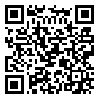BibTeX | RIS | EndNote | Medlars | ProCite | Reference Manager | RefWorks
Send citation to:
URL: http://tumj.tums.ac.ir/article-1-44-en.html
Background: Neonatal jaundice, especially breast feeding jaundice is one of the most common causes of neonatal readmission during the first month of life. Breast feeding jaundice may be due to decreased milk intake with dehydration and/or reduced caloric intake. The aim of this Study was to determine maternal risk factors of breast feeding jaundice in order to prevent it than before.
Methods: This case- control study was performed at Bahrami University Hospital, Tehran, Iran and involved 75 term exclusively breast fed newborns admitted for hyperbilirubinemia, with a weight loss greater than 7%, with one positive lab data as: serum Na&ge 150meq/lit, urine specific gravity> 1012, serum urea&ge 40mgr/dl, without assigned cause for hyperbilirubinemia. They were compared with 75 matched controls with weight loss less than 7%, without dehydration and a known cause of hyperbilirubinemia.
Results: In comparison with control group, in neonates with breast feeding jaundice, inappropriate feeding practice (P<0.033), delayed onset of lactation (P<0.0001), inverted nipple (P<0.001) were significantly higher. In our study, there was no significant difference between two groups in education level of mother, learning breast feeding practice before and after delivery, method of delivery (cesarean or vaginal delivery), primiparity or multiparity and use of supplements (water or glucose water).
Conclusion: This study shows need for special attention and follows up of mothers and neonates at risk for breast feeding jaundice, especially those with inverted nipples or undergraduate for successful breast feeding. On the other hand this study shows encouraging mothers for early lactation especially in the first hour of life decreases the risk for this kind of jaundice.
| Rights and permissions | |
 |
This work is licensed under a Creative Commons Attribution-NonCommercial 4.0 International License. |





